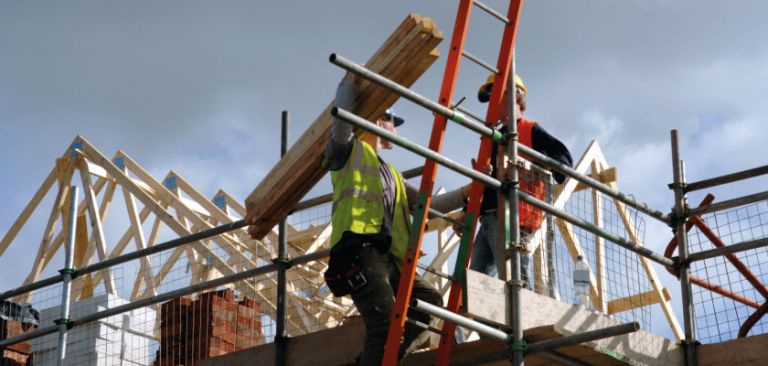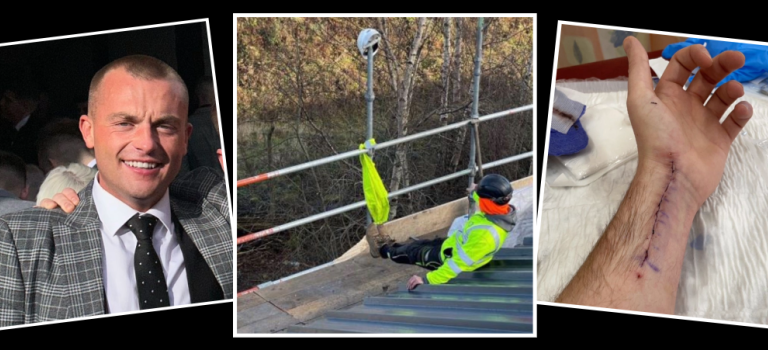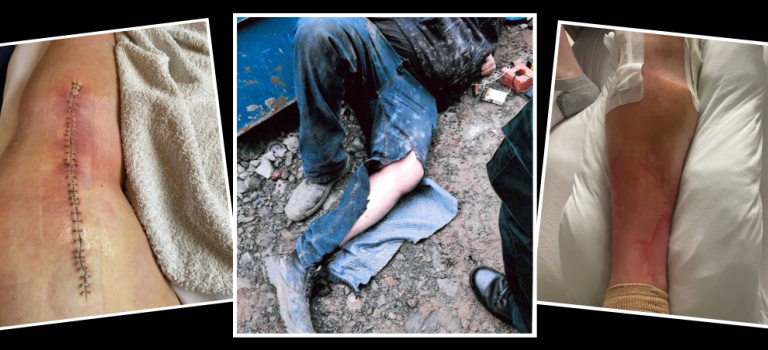Construction accident claims
Plumbers. Joiners. Electricians. Labourers. Machine operators. Scaffolders. Bricklayers. Foremen. Apprentices. Sub-contractors. Delivery staff.
Whatever your role, the construction trade presents frequent risks on a daily basis: working at height, operating power tools, manual lifting, negotiating tripping hazards, heavy machinery or falling objects, to name a few.
It is crucial that your employer upholds their duty to you to keep you as safe as possible by implementing and enforcing stringent health and safety practices.
Time and time again, Digby Brown still sees situations where proper site safety is compromised: that’s when risks become incidents: sometimes with very harmful, even life-changing, consequences.
Can I make a construction accident claim?
Yes, you may be able to make a claim if you’ve been injured in a construction site accident that wasn’t your fault or partly your fault.
Once you or someone in your family has got in touch and we’ve established we can help, you will be dealing directly with an experienced solicitor. Their job will be to investigate the circumstances of your construction injury compensation claim. This will allow us to establish fault, consider your injuries and weigh up the immediate and longer-term implications of those injuries on your life, specifically pertaining to your ability to fully return to your employment.
We will access experts in the fields of medical evidence, forensic investigation, work-related practises, employment and financial advisers to establish the implications of what has happened and consider what level of compensation is sufficient for your needs. If your injury also prevents you from returning to the same role, then your solicitor will work to recover the earnings you might have earned in the future as part of your ‘no win, no fee' case.
Your solicitor will then seek to recover any financial losses for your injury, medical treatment costs, rehabilitation costs like physiotherapy, loss of earnings and impacts to your pension and other expenses like taxi fares to physio sessions.
Our Foreign & Travel team are even able to help foreign or seasonal workers if they’ve suffered an injury while working in Scotland – alternatively, they can also help Scots who’ve been injured while working abroad or in other areas of the UK.
No win, no fee personal injury solicitors
The expression “No win, no fee” is often used in personal injury cases. It is used as a way of funding a compensation claim where the accident victim does not have the means to pay for the costs involved as the case progresses.
A number of solicitors are prepared to handle personal injury cases on a “No Win – No Fee” basis but very few are able to offer their clients complete protection if the case is unsuccessful.
In that event, the client could end up being liable for many thousands of pounds in legal expenses or the case won't be fully investigated and therefore likely to under-settle.
Compensate 'no win, no fee' funding
Digby Brown has its own funding company, Compensate, which provides the funding to allow the case to be fully investigated, employ the best experts surrounding the circumstances of the accident and/or injuries sustained and where and if necessary go to court.
If for whatever reason the case is unsuccessful, Compensate pays all your legal expenses and those of your opponent – you pay nothing.
On average our clients receive over 3 times the pre-litigation offer
Because of Compensate funding Digby Brown's success rate is extremely high and on average our clients receive three times the pre-litigation offer.
In the event the case is successful, a small percentage of your damages will be deducted with VAT to pay for this service. The percentage which Compensate will charge depends on the degree of risk involved. We believe that this is the fairest method of giving clients access to justice whilst ensuring their cases are fully investigated, prepared and funded.
Don’t take our word for it, just read many of the court decisions and case studies on our website.
Beware of compensation offers which may be too good
We know you will have seen many adverts offering 100% compensation or telling you that you will not lose any of your compensation, however we believe there are a number of problems with companies that do this.
- How do they make their money if they don’t charge you anything?
- If they aren’t taking any money from you, the client, what incentive do they have to ensure you receive the right level of compensation, appropriate to the injuries you have sustained?
- Fully preparing a case, finding out exactly what happened and what the consequences of your injuries may mean in the long term, is expensive, how do they do this properly?
- If they aren’t fully preparing these cases will they just accept the first offer they are given on your behalf by the Insurance company?
- It makes simple business sense, the less work they do the higher their profit margin is - they simply have no incentive to work harder on your behalf.
- These adverts in the main are from English firms on national television which operates in a different way and therefore wouldn’t apply to a Scottish person.
We know from the many client cases we mandate from other firms of solicitors (in the main at the request of the client who is extremely unsatisfied with the service received for the other firm) that many shortcuts are taken in preparation and that the first offer received is being recommended for acceptance, regardless of the value.
Getting something for nothing is usually the first sign of poor service.
Correct level of compensation with Digby Brown
Our experience and statistics show time and time again we will achieve the correct level of compensation which will be substantially more than the insurer is initially prepared to offer.
Even after we have deducted our percentage as a success fee you will gain considerably more than you would have achieved using a 100% compensation model.
Contact Digby Brown's personal injury solicitors
We have offices across Scotland in Glasgow, Edinburgh, Dundee, Kirkcaldy, Inverness, Aberdeen and Ayr.
For further information about no win, no fee, or anything else, call us on 0333 200 5925 or fill in our enquiry form below and someone will get back in touch with you.
What are the most common types of accidents in construction?
The HSE tracks and provides annual statistics for workplace injuries which state that the most common non-fatal types of accidents are:
- Slips, trips or falls on the same level - 30%
- Injured while handing, lifting or carrying - 18%
- Falls from a height - 8%
- Struck by a moving, flying or falling object - 11%
However, a building site has countless dangers and if you’ve been injured in an accident which doesn’t fall into the sections above, we may still be able to help you achieve fair compensation.
What are the main causes of building site accidents?
Construction site accidents can happen for various reasons. There are a huge number of hazards, and it's your employer's responsibility to ensure that you're kept as safe as possible in your workplace.
The following are some of the most common causes of construction site injuries:
Lack of appropriate risk assessments
One of the most important steps to reduce risks to workers is a thorough risk assessment. This can be done by the employer or a specialist. Once the risks have been identified, the employer should then take reasonable steps to remove or reduce them. For example, if a risk assessment identifies that there is a risk of injury from falling objects, they could put in place exclusion zones, warning signage and procedures for securing materials.
Absence of safety training
It is the duty of the employer to provide appropriate health and safety training to every employee who will be present on the construction site to minimise the risk of accidents, trips and falls.
Lack of training on machinery
It sounds obvious but we have many examples of bosses telling people to use a piece of equipment with little or no training. If you don’t know how to use it how are you supposed to use it safely. End result a serious injury.
Lack of breaks
You've probably heard this before: working while tired is dangerous. It's especially risky when you're responsible for operating heavy or dangerous machinery, as you may not be able to perform your duties at an optimal level of safety. That's why by law, you're entitled to regular breaks and your employer should be aware of this. Failing to take a break could cause you to become tired, which can then lead to accidents and injury not only to yourself but also others.
Faulty equipment or poorly maintained tools
Equipment defects are a common cause of injury on construction sites. It's important that equipment is thoroughly tested for safety before use as even a small defect could cause the equipment to be dangerous. It's your employer's responsibility to notice any faults, regularly inspect equipment and replace equipment when necessary. They have specific responsibilities under the PUWER equipment regulations to check that equipment is suitable and safe for its intended use. This includes ensuring that the correct safety devices are in place. If you see a fault with any equipment or believe something may be faulty, report it immediately to your supervisor or manager.
Lack of PPE
Employers should do everything they can to prevent and reduce the chance of accidents in the workplace, but sometimes that just isn't possible, for example, if you need to work with materials which contain silica. In these cases, following PPE Regulations is your employer's duty.
Unsuitable safety measures when working at a height
Everyone deserves a workplace which is free of hazards but sometimes employees are not given the tools or training to protect themselves. This can lead to serious injuries, like those that occur when workers are injured in falls from scaffolding, ladders, roofs and other heights.
The Work at Height Regulations 2005 set out rules for employers to follow when it comes to fall protection systems and other safety measures. The HSE's ‘Working at height' guide provides specific advice on suitable safety equipment.
What should I do if I'm injured in a construction site accident?
There are several key things that should be carried out following most building site accidents.
Responsible employers should already know this as well – after all, some of these steps are laid out in accordance with legal regulations. However, knowing how to report an accident on a construction site in advance could help you and your family recover building site accident compensation:
- Seek medical help
- Report the accident to your employer or site manager and make sure it’s recorded in an accident logbook
- Take photos or videos of the scene, your injuries and any faulty equipment
- Gather names of witnesses
Accidents on building sites can happen for a variety of reasons which is why it is so heavily regulated.
Some of the most referred to regulations are:
The Construction (Design and Management) Regulations 2015 - This integrates health and safety into the management and planning of any construction project so everyone involved can work together safely from the start of a project.
The Work at Height Regulations 2005 - This requires employers to ensure any work at height is properly planned, appropriately supervised and carried out in as safe as way as is practical.
These rules are not optional – they are mandatory. They are also not just box-ticking exercise. Building trade regulations literally save lives. It’s possible some even exist because of a previous tragic accident. It is crucial to remember that if the worst happens, then you or your family may come to rely on these regulations too.
How long have I got to make a claim?
Generally speaking, you can make a claim up to three years after the date of the accident. However, there are a few circumstances where the courts sometimes grant more time. Such as if you suffered a serious injury (like a brain injury) and were not able to seek legal advice at that time.
However, we always advise that you make a claim as soon as possible so there is enough time to carry out an investigation and capture witness statements.
What if the accident was partly my fault?
It’s common to feel that something may be your fault, or what you should have done to safeguard yourself after an accident. Even if you feel that you were partly at fault for the accident, you may still have a claim under something known as “contributory negligence”. This is where we’ll work out how much of the fault can be attributed to you. For example, if 10% of the fault was attributed to your action, you'll still be able to secure 90% of the compensation.
Who is responsible for safety on a construction site?
Construction site accidents can be complicated because there are usually many people with various jobs, and it can be hard to figure out who is at fault when there is an accident.
It's also possible that another company may be responsible for the accident, such as a company that supplies materials or has been asked to dispose of waste.
However, generally speaking, employers and site managers are responsible for making sure that construction sites are safe as specified by the HSE, including implementing guidelines which include; the Health and Safety at Work Act 1974 and the Construction (Design and Management) Regulations 2015.
What are my rights if I’ve been injured on a construction site?
Negligent employers are legally bound to compensate people injured by their failings. Construction injury compensation is your legal entitlement and it can make the difference when it comes to protecting the future of you and your family. There are also literally hundreds of laws and regulations specifically designed to keep tradespeople safe, it is these laws that employers and site managers are obligated to follow.
One client we helped was Connor Penman. He was a bricklayer who was asked to operate a chop saw – a task that was new to him. His employer failed to give Mr Penman the right training, equipment and risk assessment and sadly it resulted in our client suffering an injury to his fingers. Thankfully, we were able to help secure him £70,000 in damages.
Why should I use Digby Brown for a construction accident claim?
Digby Brown’s track record in navigating the complex world of construction injury claims has resulted in millions of pounds being recovered for injured tradespeople every year with our expertise recognised by the leading bodies of the legal sector.
With over 100 personal injury solicitors dedicated to recovering compensation for accident victims, we are both the largest and most widely recognised expert in personal injury claims in the workplace.
We are proud to know the work we do for clients in workplace injury compensation claims has a positive knock-on effect on workers all over the world. Holding employers accountable via civil claims has helped improve safety standards across industries, sectors and even nations.
Next steps
Please get in touch. Our Legal Enquiry Team is open seven days a week. We can talk through what happened and help you to get back to where you need to be.
0333 200 5926
Monday to Friday: 8am - 7pm
Saturday and Sunday: 12pm - 4pm
(Please note, local rate, even from mobile)
Email enquiry form
Complete our enquiry form and we will strive to reply within 24 hours
Follow us
What our clients say about us
We put our clients at the centre of everything we do and are committed to providing the very best service. The hundreds of five star reviews we have received on Trustpilot is a reflection of this approach.

-
based on 3,193 reviewsShowing our 4 and 5 star reviews.



